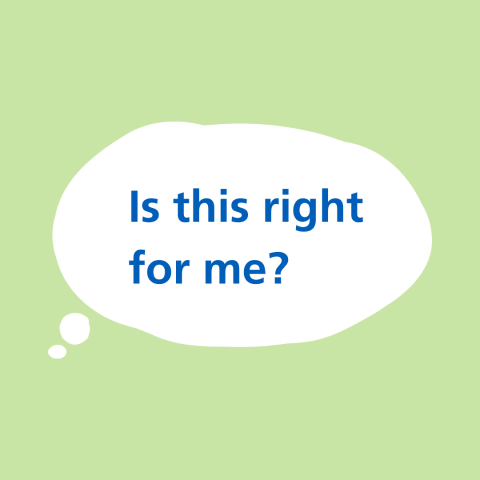Our Overcoming Low Mood Course introduces you to some helpful techniques to improve how you feel.
It’s also an opportunity to meet others who may be feeling similarly to you, although the session is not group therapy and you will not be asked to share your personal experiences with others.
The course is free and runs for five weeks. This course is available online and we have some courses available face to face. The online course is 1.5 hours each week and the face to face course is 2 hours each week.

- I want to learn techniques to manage my mood
- I am aged 18 or over
- I can attend all sessions
- I am willing to practice some of the techniques at home between sessions
- I am happy to be involved in a group format
A bit more about the course
The online and face to face courses cover the same content and they are delivered by two of our experienced Psychological Wellbeing Practitioners.
The Low Mood course is one of our Improving Wellbeing Sessions which aims to improve your understanding of low mood and give you practical techniques to help make changes to feel better.
Online Course: Microsoft Teams, 1.5 hours long with a break half way through.
You will be provided with a downloadable course handbook with some techniques for you to practice at home.
Face to face course: Small group (upto 12 people), locations across the city, 2 hours long with a break half way through.
You will be provided with a downloadable course handbook that you can use in session by bringing your own laptop/ipad or other device. We can also provide a printed copy in session.
Below you can see the different topics we will cover each week.
The first session begins by defining what low mood is and how it can affect us. You will also prepare for the next five sessions by setting goals to work towards.
The second session focuses on how low mood can affect motivation and how we can start doing more to feel better.
The third session identifies how unhelpful thinking can affect mood and how this can be managed by challenging unhelpful thoughts and thinking more realistically.
The fourth session includes information about health behaviours that can improve mood. There is also a guide to a technique that can help us solve practical problems.
The final session brings everything we have learned so far together and helps you maintain the progress you have made as well as prepare for the future.
Course dates
Our Overcoming Low Mood course runs on a regular basis throughout the year. We have online courses running on Tuesday and Thursday evenings 530-7pm and a face to face course running on a Friday 1-3pm.
First, you need to book an assessment with a Psychological Wellbeing Practitioner (PWP). They will discuss the course and how it will help you. The PWP will be able to book you onto the next available course.
How do I book a place?
If you would like to book a place on this course all you need to do is fill in our online referral form.
Select the ‘Overcoming Low Mood’ course as your preferred treatment option.
You can also call us on 0114 226 4380 and speak to one of our team.
Once you have completed your referral you will be invited for a short assessment call with one of our Psychological Wellbeing Practitioners.
Feedback from attendees
Hundreds of people attend our Overcoming Low Mood course every year. Here’s some of the feedback they have shared about the course:
“The sessions were brilliant and made me realise I’m not on my own.”
“I was anxious initially but my confidence grew and I enjoyed the sessions.”
“I was spending more time on my own because I was feeling worried and down, these sessions helped me learn ways to get better and feel like me again.”
Frequently asked questions
We know that coming to a course like this for the first time can be quite daunting and you’ll have lots of questions about what to expect.
Below is a list of some of the most common questions we are asked and some answers to help put your mind at ease.
Book an assessment with one of our team today
Share this page